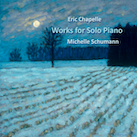

Eric Chapelle: Works for Solo Piano
Companionable Streams Music Records
Listeners whose taste gravitates in the direction of Chopin and Debussy should find much to like about this latest collection of lyrical pieces by Austin, Texas-based Eric Chapelle. Whereas he's behind the keyboard on his earlier recordings, for Works for Solo Piano he brought Michelle Schumann, a classically trained pianist and Professor of Music at the University of Mary Hardin-Baylor, aboard. She's more than a hired hand: Schumann worked with him for three years on the recording and through her involvement influenced the writing of new compositions. Awareness of her superior technical dexterity freed him, for example, to write unreservedly challenging material knowing she'd be able to handle it. As an artful interpreter, she also enhanced the material by building on the sheet music with personal touches, be it a modification in tempo or nuance of touch. Testifying to the collaborative nature of the project, their names are displayed equally prominently on the release cover.
The release of the forty-nine-minute album, recorded in two sessions, one in June 2021 and the other May 2023, is an important event for Chapelle, considering that it's his first full-length since 2010's Across the Water—even if he's issued a number of singles in the interim, four of which appear on Works for Solo Piano. In recruiting Schumann, he chose well: she's a seasoned, award-winning musician who's performed at venues and festivals around the world and is as comfortable playing Gershwin, Glass, and Nyman as Bach, Schubert, and Cage. Such breadth obviously attests to her versatility.
While some pieces are programmatic and rooted in Chapelle's personal experiences, others hew to formal classical type. Titles such as “Place in Landscape (Baga Beach)” and “(Fall) Leaves falling on a gray day” suggest ties to the Impressionism of Ravel, Debussy, and Fauré, and the composer himself notes that “Place in Landscape Moulin de Senlis” was written to capture his experience at the Paris locale in the mid-‘50s as a child. At eight minutes, it's also twice the length of most of the other pieces and thus affords the composer ample time to evoke the character of the fifteenth-century mill and the French setting. Though it's unclear what specifically happened to Chapelle at the site, musically the material oscillates between expressions of stately grandeur and playful ones emblematic of childhood innocence. While “Place in Landscape Moulin de Senlis” doesn't tower over the others in the set, a strong argument could be made for it as the album's pièce de résistance. Following close behind, however, are “Reflection No. 1” and “Nocturne No. 1” when their respectively harmonious and poignant expressions are so beguiling.
The transporting character of Chapelle's music is resoundingly conveyed in “Place in Landscape (Baga Beach)” through a lustrous combination of sparkling upper-register patterns and grounding bass chords. A similar design animates the lilting flow of “In the Presence of Beauty,” though this time the balance between the bass and treble parts is more equal. It's also a deceptively challenging piece that benefits from a pianist with the technical command of Schumann. In keeping with its title, “(Fall) Leaves falling on a gray day” introduces a wistful, nostalgic mood to the album; a review of the score also reveals the piece to be more complex than one might suspect, alternating as it does between three sharps and six flats and a plethora of time signatures. The same could be said of the heavily chromatic “Contemplation from a Distance,” whose delicately voiced chords induce a state of drowsy calm in the receptive listener.
Unison bass and treble chords lend “Full Circle” a resonant chiming quality, though the piece includes a note by Chapelle that the chords shouldn't be played percussively but instead “in a gentle approach as if diving gently.” The impact of Schumann on the presentation resonates clearly when she injects the subtlest of pauses between measures, a treatment that bolsters the lilting feel of the music. In keeping with its title, the brooding “Prelude in C# Minor (In Remembrance)” plays like an heartfelt homage, while the chords-driven first part of “First Light” intimates that Satie could be added to the list of Chapelle's kindred spirits; it's an unfailingly pretty creation, regardless. Oft serene and always evocative, his painterly music is easy to give oneself to. The reason why so many years followed the release of Across the Water isn't clear, but hopefully it won't be another thirteen years until the follow-up to Works for Solo Piano materializes.March 2024